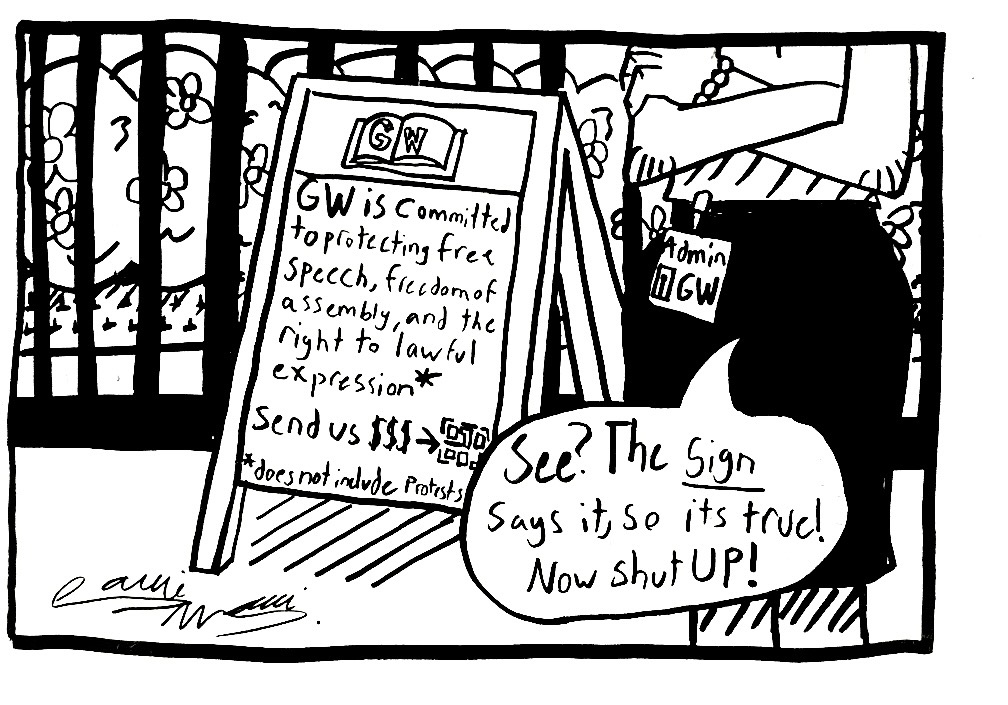Lisa Schwartz is an associate professor at the School of Medicine and Health Sciences, Leonard Friedman is a professor at the Milken Institute School of Public Health, Shmuel Ben-Gad is a reference and collection development librarian at Gelman Library, Joshua Glazer is an associate professor at the Graduate School of Education and Human Development, Deborah Wassertzug is a reference and instruction librarian at Himmelfarb Library, Rachelle Heller is a research professor at the School of Engineering and Applied Science, Barry R. Chiswick is a professor at the Columbian College of Arts and Sciences and the Elliott School of International Affairs, Robert Eisen is a professor at the Columbian College of Arts and Sciences, David Ettinger is a librarian at Gelman Library, Adam Friedman is a professor at the School of Medicine and Health Sciences, and Lisa Leibow is an assistant professor at the College of Professional Studies.
In response to the Faculty and Staff for Justice in Palestine op-ed on Oct. 28, we, the members of GW Faculty and Staff Against Antisemitism and Hate, believe it is critical to underscore that advocacy for justice must prioritize the well-being and dignity of every individual, including both Palestinian and Jewish students, as well as all other communities on campus. Inclusivity is the foundation for all students to pursue their education without fear or bias. Advocacy for justice goes hand in hand with careful analysis of historical and political context, and this obligation is particularly applicable in a university setting. We fully support the right to free speech, political expression and the discussion of complex global issues. But the role of faculty extends beyond simply endorsing free speech; it includes the responsibility to model respectful and evidence-based discourse and to provide a safe and inclusive academic environment.
We must be vigilant in ensuring that discussions do not devolve into inflammatory, misleading or factually incorrect language that marginalizes, alienates or threatens specific communities on campus. The FSJP’s op-ed reference to Israel’s “bombing campaigns in Syria, Lebanon, Iran and Yemen” blatantly fails to teach members of the GW community to critically evaluate the nature of the crisis of the Israel-Hamas war. It ignores the Hamas massacre of Israeli civilians on Oct. 7, and the killing and holding of hostages in Gaza for over 400 days, some of whom are American citizens. Hamas slaughtered more than 1,200 men, women and children, including 46 Americans and citizens of more than 30 countries, on Oct. 7. As of today, there are an estimated 97 remaining hostages, many assumed dead, including seven Americans. Nor does the FSJP op-ed acknowledge the roles of terrorist organizations, Hamas, Hezbollah, the Houthis and all proxies of the Islamic Revolutionary Guards Corps of Iran, in the conflict. Since the day after Hamas launched the Oct. 7 massacre in Israel, Hezbollah in Lebanon has fired more than 10,000 missiles into Northern Israel, displacing tens of thousands of its citizens, while the Houthis have disrupted world-wide trade in the region through its launching of missiles and drones into the Red Sea, from within Yemen. On Apr. 13 and Oct. 1, Iran attacked Israel directly with hundreds of ballistic missiles launched at the country. If not for Israel’s defense systems, tens of thousands of civilians could have been killed or injured.
Equally important, it is crucial that activism on campus does not allow for the normalization of antisemitic speech, symbols or actions, or any other forms of hate, like the signage seen in the encampment referring to the “final solution” or telling the multi-ethnic citizens of Israel to “go back to Europe”. The FSJP op-ed stated “Participants were peaceful, welcoming and disciplined” when the reality was far from the truth. In one of President Granberg’s statements on the encampments she wrote “However, when protesters overrun barriers established to protect the community, vandalize a university statue and flag, surround and intimidate GW students with antisemitic images and hateful rhetoric, chase people out of a public yard based on their perceived beliefs, and ignore, degrade, and push GW Police Officers and university maintenance staff, the protest ceases to be peaceful or productive. All of these things have happened at GW.” Members of GW Faculty and Staff Against Antisemitism and Hate personally heard protesters yell, “Zionists are not welcome here.” We can only begin to imagine the chilling impact these calls had on both Jewish and non-Jewish students who wished to complete their final examinations and attend commencement ceremonies without disruption or fear of harassment and hate.
Our shared commitment as educators is to cultivate an environment where justice is pursued in a manner that respects all identities. In this pursuit, we envision a campus where students feel supported in exploring their beliefs within a framework of empathy, integrity and mutual respect.
We invite our FSJP colleagues to join us in a face-to-face, facilitated discussion to share our perspectives and the mutual desire to educate our students to be reflective, critical thinkers. Let us ALL strive to make GW a beacon of inclusive justice that rises above division, building solidarity across differences to confront hate in all its forms.


